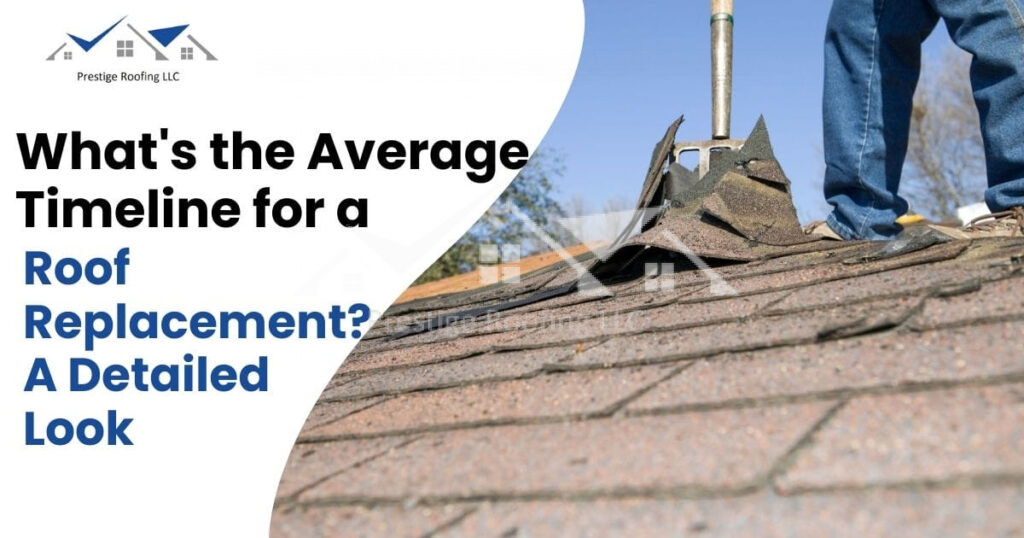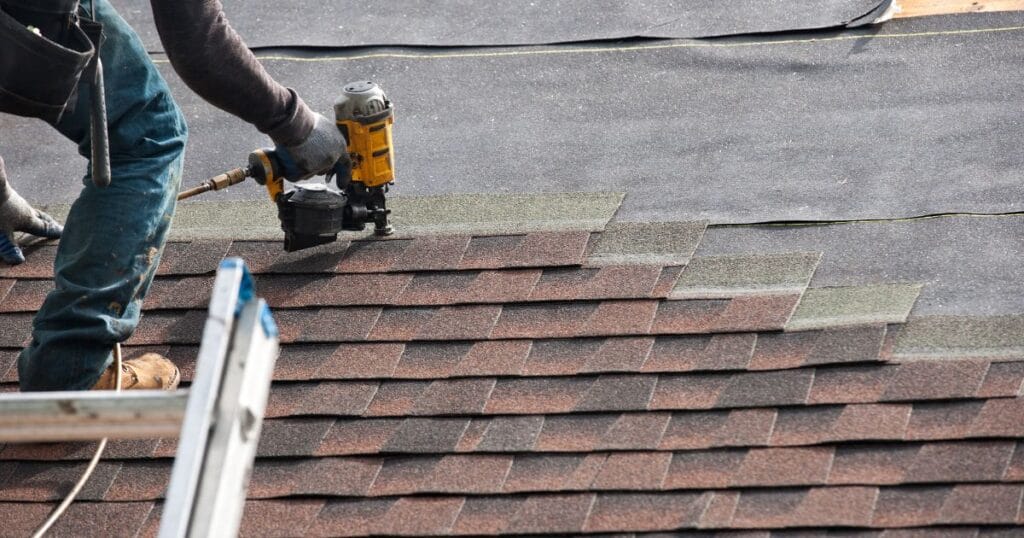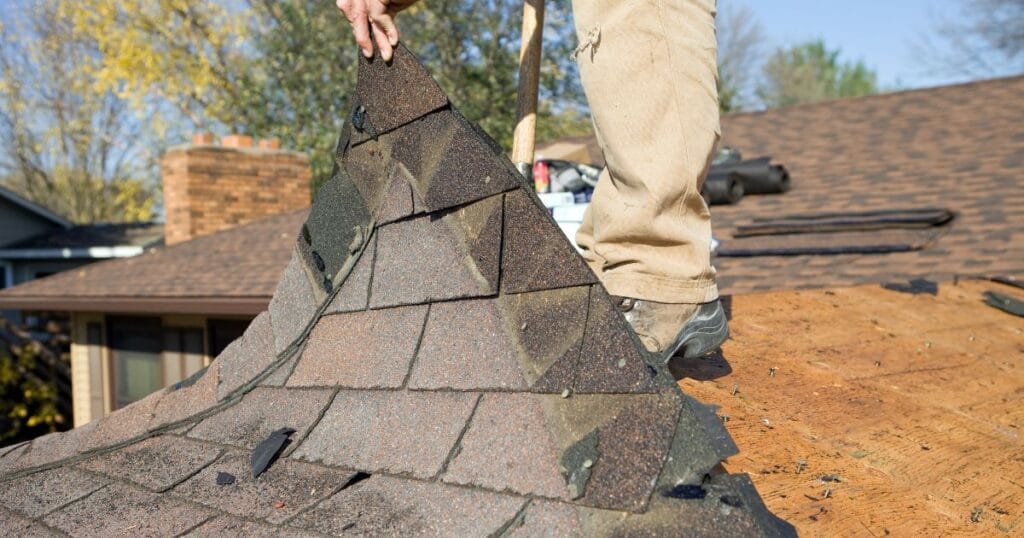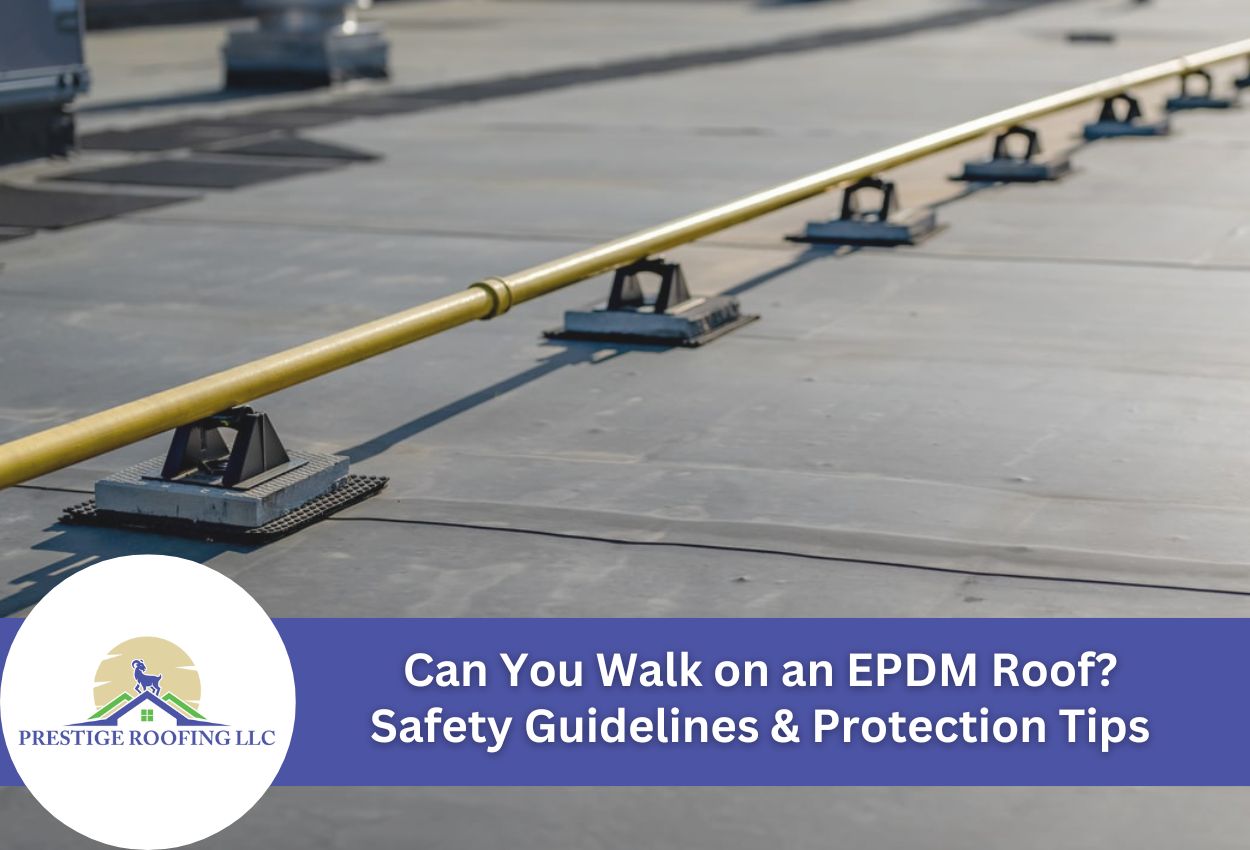
Imagine it’s pouring outside and you’re sitting comfortably in your living room, enjoying the sound of raindrops hitting your roof. Now, picture noticing a leak from the ceiling — not quite as cozy anymore, right? This scene is enough to stress the importance of a well-maintained roof over your heads.
Keeping your roof in good shape is crucial not only to avoid unexpected leaks but also to ensure the insulation and aesthetics of your home. But how do you figure out when it’s time to say goodbye to that old roof and replace it with a new one?
In this blog post, we will take a detailed look into the average time it takes to replace a roof and the factors that influence the process.
Factors That Determine The Roof Replacement Timeline
Many homeowners may wonder about the typical lifespan of a roof or how often they might need a replacement. The truth is, there isn’t just one simple answer! Several factors determine the average roof replacement timeline:
#1. Materials and Roof Age:
Not all roofs age at the same rate. The frequency of roof replacement is heavily influenced by the materials used and the level of wear and tear. Asphalt shingle roofs are the most popular choice for residential roofs and typically need to be replaced every 20 years. Higher quality architectural shingles may extend this lifespan to around 30 years, while metal roofs, with proper maintenance, can endure for 50 years or more.
#2. Size and Complexity of Your Roof:
The size and complexity of a roof directly impact the replacement timeline. Larger roofs naturally take longer to be replaced. Properties with steep slopes, multiple layers of old materials, or intricate elements like chimneys and skylights necessitate special attention, further extending the process.
#3. Accessibility of Your Roof:
Roof accessibility is a critical aspect that shapes the replacement timeline. Difficulties in reaching specific roof sections due to obstacles like tall trees or tight spaces around the house can significantly slow down the replacement process.
#4. Choice of New Roofing Material:
The type of roofing material chosen also affects the installation duration. While some materials, like asphalt shingles, can be quickly installed within days, others, such as slate tiles, require more time due to their weight and the need for skilled craftsmanship.
#5. Weather Conditions on the Day of Your Roof Replacement:
Weather unpredictability is a factor that can dictate the timeline. Ideally, the replacement will take place on clear and sunny days. Adverse weather like rain or snow can lead to delays until more favorable weather prevails.
#6. Initial Estimate and Scheduling Service:
The preparatory stage of scheduling a roof replacement involves obtaining initial estimates, setting service schedules, and making appointments for assessments. Comparing quotes from different contractors and considering budget constraints are important steps in determining the roof replacement schedule.
#7. Installation Day and Duration:
The actual installation day marks the beginning of the construction activity. The contractor’s team removes the old roofing elements, prepares underlayment layers for new material placement, and begins in the installation process. The duration depends on team expertise and factors discussed earlier, with average installations ranging from one day to over a week.
#8. Additional Factors
As mentioned above, when it comes to replacing a roof, the project timeline is influenced by various factors. However, additional factors like obtaining local permits, the removal of multiple layers of old roofing, and unexpected issues like rotten wood or water damage beneath existing shingles can also impact the timeline.
Typical timelines for roof replacement, considering these factors, range from one to three days for smaller roofs and up to several weeks for larger and more complex roofs. Considering all these factors is crucial for optimal results and to prevent potential delays.
Read More: How Often Should You Replace Your Roof?
Tips to Ensure an Efficient Roof Installation

It’s no secret that roof replacement projects are a significant undertaking. It is also important to understand that they can be time-consuming, costly, and somewhat stressful. However, there are steps you can take to increase the efficiency of this process.
#1. Plan Ahead for Any Potential Delays or Complications
Proper planning is your best defense against project delays and unexpected complications during your roof replacement project. It ensures smooth progress with minimal disruptions.
- Anticipate Weather Interference: Inclement weather conditions might pop up on the day of installation. Check long-term forecasts before scheduling your roofing project.
- Choose Your Material Wisely: Depending upon availability, the selection of unique or less commonly used materials may extend lead times.
- Arrange Accommodations if Needed: Consider how noise or disruption might impact people within your home during the workday, especially in a prolonged roof replacement timetable.
- Prepare Your Home’s Exterior: Make sure your driveways or sidewalks are cleared of cars, toys, and other obstructions that can hinder access to the roof.
- Gauge Lead Times for Permits: If you live in an area where construction permits are required, factor in their approval times as well into your roofing schedule.
By anticipating these possible situations beforehand, you can potentially mitigate them, paving the way for a smoother roof replacement.
#2. Hire Experienced Professionals for the Job
Hiring experienced professionals for your roofing job is crucial to ensure the quality and longevity of your new roof. Experienced contractors efficiently handle various roof types, stick to timelines, and offer warranties, protecting against future issues. Despite the initial cost, investing in their expertise makes your roofing project less stressful, more predictable, and ultimately worthwhile.

Cost of a Roof Replacement
The cost of a roof replacement is a crucial factor in deciding when to proceed with the project. This cost encompasses various elements, from material expenses to labor charges influenced by local wages and market conditions. Additional fees for permits and waste disposal also contribute to the overall cost, emphasizing the need for careful planning.
Let’s break down some components contributing to total cost of a roof replacement:
#1. Roof Size and Complexity:
It goes without saying that larger roofs take more time and resources to install. Complex designs or structures can pose additional challenges demanding more intricate work, thereby increasing costs.
#2. Material Prices:
The kind of materials you choose for your new roof matters. Cheaper materials might save money at first, but they could wear out faster, leading to more costs in the long run.
#3. Labor Expenses:
The people doing the roof work need to be paid. The size, difficulty, and features of your roof affect how much time and effort is needed, which may raise labor costs.
#4. Inspections and Permits:
Sometimes, you need to get your roof inspected or get permits during the replacement process. This can add to the overall cost.
#5. Disposal Fees:
After the old roof is taken off, there’s debris that needs to be thrown away. Some contractors include this cost in their estimates, so it’s good to check.
By considering these factors, you can properly prepare your budget for the total cost of a roof replacement.
Best Roof Replacement Services In Wisconsin
As a homeowner, stressing the significance of roof replacement is crucial. It’s not just about aesthetics, it’s about safeguarding your home from harsh weather. Understanding factors influencing the timeline, such as roof size, material, climate, and accessibility, helps in planning without unnecessary stress. Hiring experienced professionals, like Prestige Roofing LLC, ensures quality service, minimizing potential delays.
Get your roofing project off to a great start with Prestige Roofing LLC free estimate and inspection. We offer transparent pricing without hidden costs. Our qualified in-house team boasts over 50 years of combined experience and have successfully completed over 2,000 jobs. Prioritizing customer satisfaction through open communication, we also offer a 10-year labor warranty, ensuring the longevity and protection of your investment. Get in touch with us today at (920) 791-0414.




